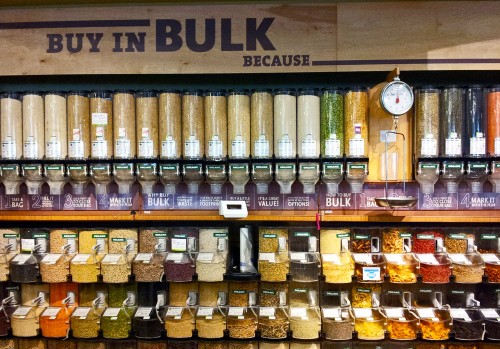Is buying in bulk better?
The COVID-19 outbreak is still causing a lot of panic in communities around the world. Naturally, families rush to the stores to stock up on necessities like food, water, and hygiene items. Some of the most notable items include paper towels and toilet paper. People line up outside of stores in hopes of grabbing a few for themselves. Under the circumstances, I think it is reasonable to prioritize having necessities.
However, after purchasing the same items over and over again at every store, I’ve stopped to ask: “Is buying in bulk better?” According to the Environmental Protection Agency, around 45% of waste in landfills consists of food packaging and containers.
Bulk buying can be more environmentally friendly because most bulk purchases require significantly less packaging per use than smaller purchases have. For example, a jumbo jug of laundry detergent requires less plastic than multiple smaller containers. Additionally, bulk buying can decrease the amount of trips to the store which can save you time while reducing CO2 emissions.
However, there are a few variables to consider before switching to bulk purchasing.
Type of item:
It may be common sense, but you don’t really need to buy everything in bulk. Purchasing in bulk usually implies food, hygiene items, and a few household items. Things that you might want to consider include cooking oil, snacks, body lotion, and laundry detergent.
Perishability:
Purchasing food in bulk can be pretty tricky. You can’t purchase 12 boxes of lettuce unless you have a need for them. However, foods like noodles, rice, can goods, nuts, and spices can be stored for a long time. Pet food is also non perishable. Plus, they are actually good to have in case of an emergency.
Availability:
Some things cannot be purchased in bulk, or they are hard to find in store. It may not be optimal for you to drive to a store that is a mile away to fill your mason jar with sunflower seeds. However, it is always a good idea to check online for package-free stores.
Cost:
Purchasing in bulk can be cheaper per unit. The savings can really add up, but buying in bulk requires more money upfront. For example, instead of paying $40 worth of shampoo now, you can spend $10 every month over the course of several months.
Household:
Although purchasing in bulk may seem nice, it’s always a good idea to consider your specific situation. A household with a few kids may need more supplies than a single person.
Written by Emily Su, Class of 2022.
Photo Credit: Food by Bri

